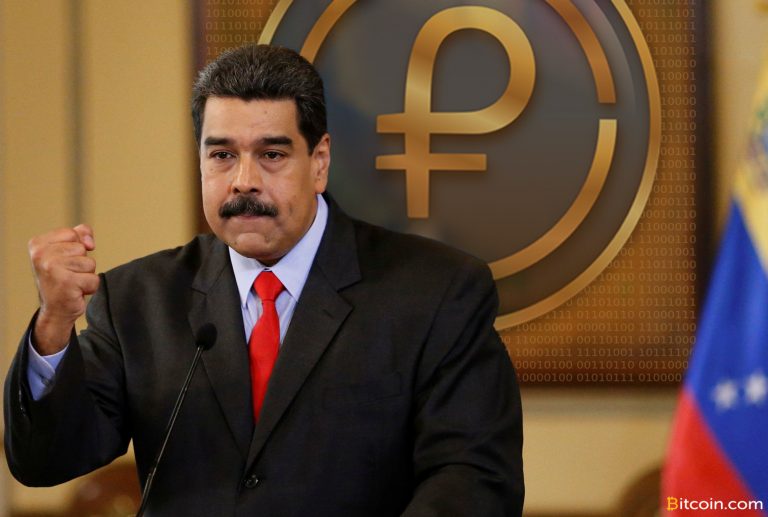Maduro’s Petro Becomes More Accessible, but Scrutinized by Venezuelans
source: Bitcoin News
2019. Feb. 26. 04:05

For a while now people were skeptical about the Petro network and questioned whether or not it even existed. Many Venezuelan citizens explained over the last few months that they hadn’t seen the new asset being used in the wild. However, recent reports detail that there are a few new methods available for residents who want to obtain the Venezuelan government issued cryptocurrency.
Also read: Bitcoin Whales Have Accumulated Thousands of Coins in the Last 2 Months
The Venezuelan Petro: A ‘Bad Copy of Dash’ With an Alleged Money Laundering Mechanism
Over the last six months, there’s been a lot of discussion about the new Venezuelan cryptocurrency called petro, a digital asset introduced to the world by the country’s president Nicolas Maduro. The creation of the Petro network was confusing, to say the least, as it was initially thought to be an Ethereum-based token.
Following the initial announcement, the platform was allegedly based on the NEM network, but in October 2018 it was finally revealed that petro was a copy of the Dash protocol. A recent document published on Steemit on Feb. 22, details that the reproduced Dash chain was “a very bad copy.” Moreover, an independent investigation details that there’s a special centralized mechanism programmed into the Petro protocol.
Sunacrip is basically in charge of most of the Petro network onboarding.“[There’s a] money laundering mechanism for government officials and this is why the US government blocked the petro,” Pedro Peroza’s post and other reports reveal. Alongside this, a well documented 4-page analysis of the Petro blockchain written by a Latin American investment house shows serious signs of money laundering using US dollars and other irregularities. The firm listed at least eight signs of money laundering practices. The report concludes that there is “conclusive evidence” reflected in the technical research of the existence of crime and fraud.
Saving in petro is promoted heavily, alongside multiple websites that gives basic information on how to access the cryptocurrency.Purchasing Petro With Crypto and Paying in Person at Sunacrip’s Headquarters With Bolivars Requires Identification
Further, Maduro’s regime has created a platform that exchanges bitcoin core (BTC) and litecoin (LTC) for petro. The author of the investigative disclosure details that the government platform is also a “bad copy of Uphold,” a legitimate trading platform based in the UK. In order for a citizen to obtain petros they must have a political card issued from the government. Besides obtaining petros with LTC and BTC, Venezuelan citizens can purchase the digital currency with bolivars at the National Superintendency of Crypto Assets and Related Activities (Sunacrip) offices located in Caracas, but personal data is required explains the petro analysis.
With the proper government-issued identification Venezuelans can buy petro with BTC and LTC.The recent state-issued “Official Gazette Number 41.575” seemingly puts Sunacrip in charge of the regulation and taxation of digital currency remittances. Venezuelans say that Sunacrip’s minimum commission is roughly “0.25 euros per transaction”
“[The Petro network] marks a milestone in economic history in the world, as it is the first digital and sovereign currency. It has been issued by the Bolivarian Republic of Venezuela with real support in wealth and commensurate goods,” explains the Sunacrip website.
“Sunacrip is promoting a remittance exchange platform using bitcoin — I believe that its main objective is the collection of taxes in cryptocurrency, for that a Law was approved in the ANC (National Assembly Madurista) where what stands out is the collection of taxes in [cryptocurrencies],” explains Peroza. “In my opinion, it will be a failure.”
The registration form for acquiring petros online in Venezuela.The price of petro is established by the government’s official exchange Dicom and Peroza believes it the only covert way to “officially devalue” the sovereign bolivar. So far, president Maduro has been criticized for raising the value of the petro in two instances and the current price per petro is roughly 14,665,500 bolivars ($59).
What do you think about the Venezuelan state issued petro cryptocurrency? Let us know what you think about this subject in the comments section below.
Image credits: Pixabay, Shutterstock, and the Sunacrip website and site extensions.
Verify and track bitcoin cash transactions on our BCH Block Explorer, the best of its kind anywhere in the world. Also, keep up with your holdings, BCH, and other coins, on our market charts at Satoshi’s Pulse, another original and free service from Bitcoin.com.
The post Maduro’s Petro Becomes More Accessible, but Scrutinized by Venezuelans appeared first on Bitcoin News.





